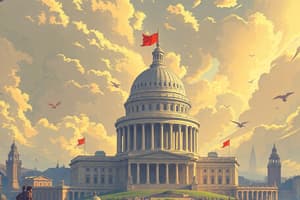Podcast
Questions and Answers
राजनीति विज्ञान के अध्ययन में निम्नलिखित में से कौन सा क्षेत्र शामिल नहीं है?
राजनीति विज्ञान के अध्ययन में निम्नलिखित में से कौन सा क्षेत्र शामिल नहीं है?
- राजनीतिक दर्शन और विचारधाराएँ
- सार्वजनिक नीतियों का विश्लेषण
- प्राकृतिक विज्ञान के सिद्धांत (correct)
- अंतर्राष्ट्रीय संबंध और कूटनीति
निम्नलिखित में से कौन राजनीतिक सिद्धांत का एक मुख्य कार्य है?
निम्नलिखित में से कौन राजनीतिक सिद्धांत का एक मुख्य कार्य है?
- विभिन्न देशों की राजनीतिक प्रणालियों की तुलना करना
- राजनीतिक घटनाओं के लिए अनुभवजन्य डेटा एकत्र करना
- सरकारी नीतियों के कार्यान्वयन का अध्ययन करना
- राजनीतिक अवधारणाओं के अर्थ और महत्व का विश्लेषण करना (correct)
किस राजनीतिक विचारधारा में व्यक्तिगत अधिकारों और स्वतंत्रता पर जोर दिया जाता है, सीमित सरकार, और कानून का नियम?
किस राजनीतिक विचारधारा में व्यक्तिगत अधिकारों और स्वतंत्रता पर जोर दिया जाता है, सीमित सरकार, और कानून का नियम?
- समाजवाद
- उदारवाद (correct)
- साम्यवाद
- रूढ़िवाद
एडमंड बर्क किस राजनीतिक विचारधारा से जुड़े एक प्रमुख विचारक हैं?
एडमंड बर्क किस राजनीतिक विचारधारा से जुड़े एक प्रमुख विचारक हैं?
कार्ल मार्क्स ने मुख्य रूप से निम्नलिखित में से किस अवधारणा का विश्लेषण किया?
कार्ल मार्क्स ने मुख्य रूप से निम्नलिखित में से किस अवधारणा का विश्लेषण किया?
प्लेटो की रचना 'द रिपब्लिक' में किस विषय की खोज की गई है?
प्लेटो की रचना 'द रिपब्लिक' में किस विषय की खोज की गई है?
किस विचारक ने 'पॉलिटिक्स' नामक पुस्तक लिखी, जिसमें सरकार के विभिन्न रूपों का विश्लेषण किया गया है?
किस विचारक ने 'पॉलिटिक्स' नामक पुस्तक लिखी, जिसमें सरकार के विभिन्न रूपों का विश्लेषण किया गया है?
निककोलो मैकियावेली की प्रसिद्ध रचना कौन सी है, जो राजनीतिक शक्ति की प्राप्ति और रखरखाव से संबंधित है?
निककोलो मैकियावेली की प्रसिद्ध रचना कौन सी है, जो राजनीतिक शक्ति की प्राप्ति और रखरखाव से संबंधित है?
थॉमस हॉब्स ने अपनी किस रचना में एक मजबूत केंद्रीय सरकार की वकालत की?
थॉमस हॉब्स ने अपनी किस रचना में एक मजबूत केंद्रीय सरकार की वकालत की?
जॉन लॉक ने 'टू ट्रीटाइसेस ऑफ़ गवर्नमेंट' में किस सिद्धांत की वकालत की?
जॉन लॉक ने 'टू ट्रीटाइसेस ऑफ़ गवर्नमेंट' में किस सिद्धांत की वकालत की?
जीन-जैक्स रूसो ने 'द सोशल कॉन्ट्रैक्ट' में किस अवधारणा की खोज की?
जीन-जैक्स रूसो ने 'द सोशल कॉन्ट्रैक्ट' में किस अवधारणा की खोज की?
जॉन स्टुअर्ट मिल ने 'ऑन लिबर्टी' में मुख्य रूप से क्या बचाव किया?
जॉन स्टुअर्ट मिल ने 'ऑन लिबर्टी' में मुख्य रूप से क्या बचाव किया?
जॉन रॉल्स ने 'ए थ्योरी ऑफ जस्टिस' में न्याय का सिद्धांत किस आधार पर विकसित किया?
जॉन रॉल्स ने 'ए थ्योरी ऑफ जस्टिस' में न्याय का सिद्धांत किस आधार पर विकसित किया?
निम्नलिखित में से कौन सा समकालीन मुद्दा राज्य की संप्रभुता और राजनीतिक पहचान पर प्रभाव डालता है?
निम्नलिखित में से कौन सा समकालीन मुद्दा राज्य की संप्रभुता और राजनीतिक पहचान पर प्रभाव डालता है?
लोकप्रियतावाद के उदय के कारण किन मूल्यों को चुनौती मिल रही है?
लोकप्रियतावाद के उदय के कारण किन मूल्यों को चुनौती मिल रही है?
राजनीतिक संवाद और भागीदारी को आकार देने में कौन सी चीज़ एक महत्वपूर्ण भूमिका निभाती है?
राजनीतिक संवाद और भागीदारी को आकार देने में कौन सी चीज़ एक महत्वपूर्ण भूमिका निभाती है?
पर्यावरण न्याय के संदर्भ में सरकारों की नैतिक बाध्यताएँ क्या हैं?
पर्यावरण न्याय के संदर्भ में सरकारों की नैतिक बाध्यताएँ क्या हैं?
राजनीतिक शक्ति और असमानता को आकार देने में नस्ल, लिंग, वर्ग और अन्य सामाजिक श्रेणियों के प्रतिच्छेदन से संबंधित अध्ययन क्या कहलाता है?
राजनीतिक शक्ति और असमानता को आकार देने में नस्ल, लिंग, वर्ग और अन्य सामाजिक श्रेणियों के प्रतिच्छेदन से संबंधित अध्ययन क्या कहलाता है?
बढ़ते ध्रुवीकरण और राजनीतिक विभाजन के युग में लोकतंत्र का भविष्य किस प्रकार का हो सकता है?
बढ़ते ध्रुवीकरण और राजनीतिक विभाजन के युग में लोकतंत्र का भविष्य किस प्रकार का हो सकता है?
मानवाधिकारों के संदर्भ में राज्यों की मुख्य जिम्मेदारी क्या है?
मानवाधिकारों के संदर्भ में राज्यों की मुख्य जिम्मेदारी क्या है?
Flashcards
राजनीति विज्ञान
राजनीति विज्ञान
राजनीति और शक्ति का अध्ययन घरेलू, अंतर्राष्ट्रीय और तुलनात्मक दृष्टिकोण से।
राजनीतिक सिद्धांत
राजनीतिक सिद्धांत
राजनीतिक विचार के इतिहास और राजनीतिक जीवन की नियामक नींव का अध्ययन।
तुलनात्मक राजनीति
तुलनात्मक राजनीति
विभिन्न देशों के भीतर और विभिन्न देशों में राजनीतिक प्रणालियों का विश्लेषण और तुलना।
अंतर्राष्ट्रीय संबंध
अंतर्राष्ट्रीय संबंध
Signup and view all the flashcards
लोक प्रशासन
लोक प्रशासन
Signup and view all the flashcards
सार्वजनिक कानून
सार्वजनिक कानून
Signup and view all the flashcards
लोक नीति
लोक नीति
Signup and view all the flashcards
शक्ति
शक्ति
Signup and view all the flashcards
प्राधिकरण
प्राधिकरण
Signup and view all the flashcards
वैधता
वैधता
Signup and view all the flashcards
संप्रभुता
संप्रभुता
Signup and view all the flashcards
राज्य
राज्य
Signup and view all the flashcards
सरकार
सरकार
Signup and view all the flashcards
लोकतंत्र
लोकतंत्र
Signup and view all the flashcards
राजनीतिक संस्कृति
राजनीतिक संस्कृति
Signup and view all the flashcards
राजनीतिक विचारधारा
राजनीतिक विचारधारा
Signup and view all the flashcards
उदारवाद
उदारवाद
Signup and view all the flashcards
रूढ़िवाद
रूढ़िवाद
Signup and view all the flashcards
समाजवाद
समाजवाद
Signup and view all the flashcards
साम्यवाद
साम्यवाद
Signup and view all the flashcards
Study Notes
- Political science is the study of politics and power from domestic, international, and comparative perspectives.
- It entails understanding political ideas, ideologies, institutions, policies, processes, and behavior, as well as groups, classes, government, diplomacy, law, strategy, and war.
- Political science analyzes and attempts to explain these elements of politics.
Subfields of Political Science
- Political theory studies the history of political thought and the normative foundations of political life.
- Comparative politics analyzes and compares political systems within and across different countries.
- International relations examines the interactions between states, international organizations, and other actors on the global stage.
- Public administration focuses on the implementation of government policies and the management of public sector organizations.
- Public law studies the role of law in politics and society, including constitutional law, administrative law, and criminal law.
- Public policy analyzes the process by which governments make decisions and the impact of those decisions on society.
- Political methodology deals with the quantitative and qualitative methods used to study politics.
Key Concepts in Political Science
- Power is the ability to influence the behavior of others and to achieve desired outcomes.
- Authority is the legitimate right to exercise power.
- Legitimacy is the belief that a government or political system is entitled to exercise power.
- Sovereignty is the supreme authority within a given territory.
- The state is a political entity that possesses a monopoly on the legitimate use of force within a given territory.
- Government is the set of institutions and individuals that make and enforce laws and policies.
- Democracy is a system of government in which supreme power is vested in the people and exercised directly by them or by their elected representatives under a free electoral system.
- Political culture is the set of beliefs, values, and attitudes that a society holds about politics.
- Political ideology is a set of beliefs and ideas that explain and justify a particular political order.
Political Theory
- Political theory is a subfield of political science that studies the fundamental questions about the state, government, politics, liberty, justice, property, rights, law, and the enforcement of a legal code by authority.
- It explores what these concepts are, why they are (or are not) needed, what makes a government legitimate, what rights and freedoms it should protect and why, what the law should be, and what moral duties citizens owe to a legitimate government, if any, and when it may be legitimately overthrown, if ever.
- Political theory grapples with the meaning of fundamental concepts such as freedom, equality, justice, and democracy.
- It examines the nature of political authority and the relationship between the individual and the state.
Major Traditions in Political Theory
- Liberalism emphasizes individual rights and freedoms, limited government, and the rule of law.
- Core tenets include individual liberty, equality under the law, and the importance of free markets.
- Prominent thinkers include John Locke, John Stuart Mill, and John Rawls.
- Conservatism emphasizes tradition, order, and the importance of social institutions.
- Key beliefs involve respect for authority, the value of social hierarchy, and skepticism towards radical change.
- Key thinkers include Edmund Burke, Michael Oakeshott, and Russell Kirk.
- Socialism emphasizes social equality, economic justice, and the role of the state in promoting the common good.
- It focuses on addressing economic inequality, promoting social welfare, and advocating for collective ownership or control of resources.
- Prominent thinkers include Karl Marx, Friedrich Engels, and Eduard Bernstein.
- Communitarianism emphasizes the importance of community, social responsibility, and the common good.
- Stresses the interconnectedness of individuals, the importance of social institutions, and the need for collective action.
- Prominent thinkers include Michael Sandel, Alasdair MacIntyre, and Charles Taylor.
- Anarchism rejects the legitimacy of the state and advocates for self-governance and voluntary association.
- Key principles include individual autonomy, mutual aid, and decentralization.
- Well-known thinkers include Pierre-Joseph Proudhon, Emma Goldman, and Noam Chomsky.
Key Thinkers in Political Theory
- Plato (428-348 BC): Author of The Republic, explored the concept of justice and the ideal state.
- Aristotle (384-322 BC): Author of Politics, analyzed different forms of government and emphasized the importance of constitutionalism.
- Niccolò Machiavelli (1469-1527): Author of The Prince, examined the acquisition and maintenance of political power.
- Thomas Hobbes (1588-1679): Author of Leviathan, argued for a strong central government to maintain order.
- John Locke (1632-1704): Author of Two Treatises of Government, advocated for natural rights and limited government.
- Jean-Jacques Rousseau (1712-1778): Author of The Social Contract, explored the concept of popular sovereignty and the general will.
- Karl Marx (1818-1883): Author of Das Kapital, analyzed capitalism and advocated for a socialist revolution.
- John Stuart Mill (1806-1873): Author of On Liberty, defended individual freedom and representative government.
- John Rawls (1921-2002): Author of A Theory of Justice, developed a theory of justice based on fairness and equality.
Contemporary Issues in Political Theory
- Globalization and its impact on state sovereignty and political identity.
- The rise of populism and its challenge to liberal democratic values.
- The role of technology in shaping political discourse and participation.
- Environmental justice and the ethical obligations of governments to address climate change and environmental degradation.
- Identity politics and the intersection of race, gender, class, and other social categories in shaping political power and inequality.
- The future of democracy in an era of increasing polarization and political division.
- Human rights and the responsibility of states to protect and promote the rights of their citizens and others.
Studying That Suits You
Use AI to generate personalized quizzes and flashcards to suit your learning preferences.




